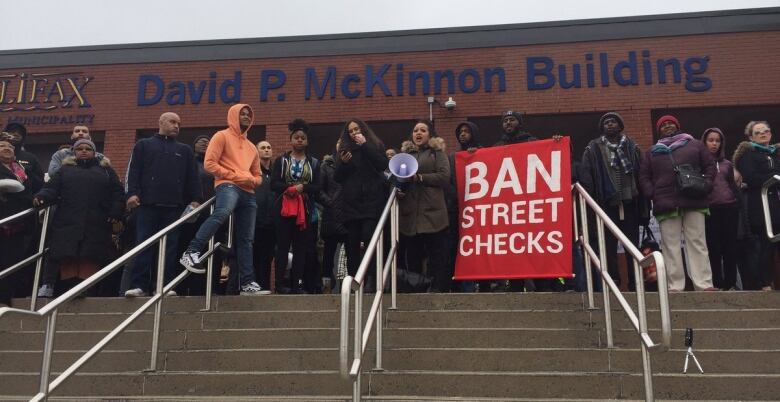Halifax police chief apologizes for street checks and historical 'mistreatment'
'I am sorry for all of the times you were mistreated, victimized and revictimized,' chief Dan Kinsella

Halifax Regional Police Chief Dan Kinsella acknowledged institutional racism, discrimination and street checks have made black men, women and children fearful of police — and issued a historic apology Friday morning for that mistreatment.
"Far too many times we have failed you," the police chief said as people in Nova Scotia's black community gathered at Halifax's central library. "I acknowledge the community's concerns that the actions of police have had a negative and deep impact on generations of the African Nova Scotian community and disproportionately on young black men."
Kinsella said the fact black men and women were targeted by street checks "has deepened that divide [between police] and the community."
But he said the now-banned practice is just one issue in moving to repair the relationship that police have created with Nova Scotia's black community.
The police chief said he's heard stories from adults and children who "describe constant fear and doubt when doing day-to-day activities."
"That is wrong," he said. "Young men describe being racially profiled and stopped by police both while walking and driving, and in those instances feeling humiliated.
"That is wrong."

Rockman Parris, who attended the apology, said he's been street checked so many times he's become "numb" to the practice.
He said he's hopeful the apology brings lasting change.
"It's all I can do at this time because they're just words," he just said.

Halifax resident Shantaya Crawley said she's been street checked.
"It still traumatizes me that they treat people this way," she said.
Crawley said she doesn't like dealing with the police because of how she's historically been treated by them.
She said there are some matters about which she'd like to contact the police but is hesitant to do so.
"I don't feel like I can trust the police in this city, I don't feel like they're really there to help people when they say they are, and it's terrifying," she said.
CBC News investigation shone light on street checks
The practice of street checks came under the spotlight because of a CBC News investigation.
That triggered a criminologist's review. When released earlier this year, it showed black people were street checked at a rate six times higher than white people in Halifax. The odds of being stopped for a street check were highest for black men, followed by Arab males and black females.
The checks involved a police officer speaking with or observing a person, and then recording personal or identifying information into a database.
Kinsella promised to create a "know your rights campaign" to educate the public about what's allowed if they're stopped by police — and what they can legally challenge. It's part of the five areas police will focus on in improving its relationship with Nova Scotia's black community.
Kinsella says police will establish an advisory committee made up of members of the community and it will bring specific concerns to the chief. Committee to be established early in the new year. <a href="https://twitter.com/hashtag/cbcns?src=hash&ref_src=twsrc%5Etfw">#cbcns</a> <a href="https://t.co/bg7fZItOpV">pic.twitter.com/bg7fZItOpV</a>
—@CBCBlairRhodesOne of the first will be launching an advisory committee made up of police and black Nova Scotians to look at specific incidents and complaints about police interactions with black men, women and youth — and report those directly to the chief.
"I, as chief, will take personal responsibility and follow up in every case.'
The committee and the broader community will be involved in creating and offering training for officers, he said.
"On behalf of the Halifax regional police, I am sorry," he said. "I am sorry for our actions that have caused you pain. I am sorry for all of the times you were mistreated, victimized and revictimized.
"While decades of injustices cannot be undone, we are committed to doing better moving forward."

Youth advocate DeRico Symonds hopes the apology leads to broader change that extends far beyond Nova Scotia's borders.
"This isn't just a Halifax thing," he said. "Racism, systemic discrimination, need to be everyone's issues, and my hope — and our hope — is that this does create leadership across Canada to have a look at what's happening here."
The move to ban street checks swiftly followed a report authored by a former Nova Scotia judge who found them to be illegal. In October, provincial Justice Minister Mark Furey banned them.
Kinsella said people who think they're in the database can file a freedom of information request to see what kind of information is there.
With files from Blair Rhodes, Elizabeth Chiu and Richard Woodbury


